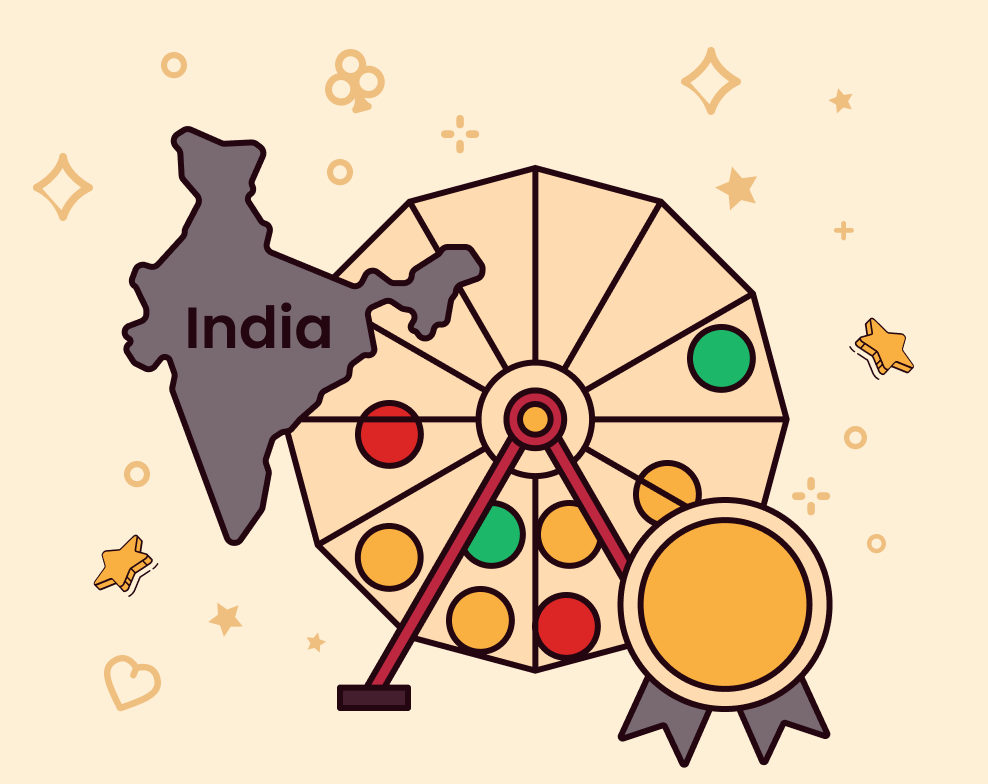Navigating The Landscape - Licensing And Regulatory Bodies For Online Casinos In India

Online gambling is a money-making machine for India today. They can potentially tempt several aged people to try gambling for once, at least in their life. Virtual gambling relaxes the fun of playing different casino games from the comfort of your home. A bonus is already in the hands of players who wish to play in the fast-paced world with the prospect of yielding fast money in a short period. However, the government of India is subjective in navigating the legal landscape of its economy through these gambling businesses. Are they capable of doing so? Let's see some aspects of licensing and regulations for operating online casinos in India.
Current Legal Framework of Online Casinos Operators in India
The constitution is not merely a lawyer's page; it is a vehicle of life and a spirit of ages. The line is apt for this segment because, in the post-Independence time when the Indian constitution was promulgated, gambling gained entrance under Entry 34 of the State List, giving exclusive powers to the state legislative body to design and implement gambling laws in their states. Currently, India has no levied legislation regulating online casino gambling or betting. The first enactment of the Public Gambling Act 1987 in India allowed gambling to be legal depending on the substantial quantum of the game of skills and the game of chances. Still, as a gambler, you can punt on different casino games at a casino online operating their services in India.
For example, the state of Goa has legalized casinos offering some exclusive casino days games to Indian players, while Sikkim offers the fantasy of lottery gambling services in their state. Therefore, the legal situation for casinos in India is complex, as stated above. Gambling is run under the regulations of the jurisdiction of individual states instead of the federal government. This creates a patchwork of different regulations and policies across the country, where some restrictions are also fixation.

Licensing and Regulatory Bodies for Online Casinos in India
Have you ever acquired a license to ride a car or a two-wheeler? As the license permits you to ride them on the road by holding a certificate, the same rule is meant for online casino operators. The gambling operator has to get a license, allowing them to offer their services to fellow citizens of India. To apply for such a license, an operator must undergo a process. As the authorized regulatory body will provide it, you have to pay a certain fee to obtain it. During this process, these regulatory bodies test and review them to ensure they aFre suitable to receive a license. Some of the criteria an online casino has to meet are:
Offering fair casino games as developed by legitimate providers.
Should enlist payment methods
Not misleading or making false promises in their bonuses and promotions.
Actively encrypting SSL technologies and other testing labs to eliminate fraudulence.
Should take promising approaches to responsible gambling.
A license is essential, both for the casino and for the players. Assume you have been offered a drink, and being a non-drinker, you have yet to learn what drink you are served. You have asked the service boy but need clarification about the information. Would you still take a sip? No, right, because offers can mislead you and be potentially harmful! Therefore, the same goes for casinos. The license is enacted as a stamp revealing approval, and the list of ingredients it bestows ensures that you know what you are getting yourself into.
Regulatory Bodies and Compliances on Approving Licenses to the Online Casino of India
The current gambling scenario says that the Indian government does not have its own regulatory body for providing licenses to the online casinos in India on a national level for gambling activity. They acquire these licenses from international regulatory bodies. One of the examples is Malta Gaming Commission.
Malta Gaming Commissions: Gambler anticipation says that this Malta Gaming Commission is one of the oldest regulatory bodies, which emerged in 2001 and became famous across Europe for covering online gambling. But now, many countries like India are taking licenses from this regulatory body as its functioning and approving ability is out of the mark, and hence provide trust and reliability at the same time to a particular casino. It protects minors from gambling, and you would have seen that some casinos do not ask for your age before letting you enter their site. It ensures players' security and that gaming options are fair.
Besides, compliance with these regulatory bodies is essential, though by the casino operating bodies, and should be looked over by you before opting for sports betting and gambling in India. Failure to comply can charge you massive losses like fines and criminal charges for running in-house gambling. To ensure compliance, gambling companies should formulate and maintain accurate records, provide accurate information about the services they offer, and make simple promises about bonuses and promotions, and deposits of funds. It is essential to adhere to all relevant licensing and taxation requirements.

Ending Note
It is just common sense to have if you need help to pick out right from wrong. It is somehow a sort of democracy that exists on spineless law-abidance. Complying law and order throughout the business is a difficult chore, but once you imbibe a smooth flow, your business arouses significantly; the same happens in the iGaming industry. Laws and orders are meant for a seamless ride of online casinos, and the operators and players should abide by them. The article is created to demonstrate them to inform the players about these laws and how they should be maintained by the online casinos running enormously in India.
The Latest News


Ana D.
•May 30, 2024
Lotteries and other forms of gambling have a colourful history in India. While lotteries are regulated under a central umbrella, how they are managed is subject to the discretion of state governments. However, the growing popularity of lotteries saw the Lotteries (Regulation) Act of 1998 and the Lotteries (Regulation) Rules 2010 introduced, which established detailed standards for the governments to follow.
Currently, lottery games are legal in 13 Indian states, though anyone of legal gambling age in India can buy international lottery tickets online. The ticket prices and prize pools of government lotteries in India vary depending on the lottery scheme and state in which it is regulated. Tickets for weekly draws begin at modest prices like ₹2 or ₹5 and increase for bumper draws and special schemes.


Akil Khan
•March 21, 2024
Whether you like it or not, luck plays a crucial role in gambling. And while many would argue that it’s an unreliable force, for many Indians, the ancient tradition of Vedic astrology offers a way to understand how luck works in the universe and how one could potentially manipulate it to work in one’s favour.
Vedic astrology (known as Jyotish in Sanskrit) is the practice of studying planetary positions, celestial influences, and karmic patterns to understand how these influence and shape human lives and destinies.
When it comes to gambling, some Indians look to Vedic astrology to boost their chances of success. By analysing astrological charts and horoscopes, and identifying cosmic connections, gamblers seek to find the most advantageous time to gamble, looking for lucky combinations of numbers, or even charms and rituals to help improve their chances.
Let’s look at this more closely:
Planetary configurations
"Muhurtha", an essential principle of Vedic astrology, indicates the opportune time to partake in certain activities based on planetary configurations. It also highlights when best to avoid certain activities. So, in the case of gambling, a player would wait for a favourable Muhurtha to maximise their chances of success.
Presence of the planets
Vedic astrology focuses on nine “grahas”, which are collectively referred to as the “navagrahas” (nava meaning nine). They include the sun (Surya), moon (Chandra), Mars (Mangala), Mercury (Budha), Jupiter (Brihaspati), Venus (Shukra), Saturn (Shani), Rahu (north node of the moon), and Ketu (south node of the moon). According to Vedic astrology, the planet Venus offers luxury and Jupiter provides immense wealth. A conjunction of Jupiter and Venus unafflicted with the moon is therefore said to bring good luck and prosperity.
Birth charts
Many Indians strongly believe in analysing their birth chart in every aspect of their life. This comes from Vedic astrology, which argues that the alignment of different celestial bodies at your birth can provide invaluable insights. In the case of betting, it could highlight a person’s gambling and risk-taking tendencies and subsequent strategies they could employ to maximise their chances of winning, translating into profits and success.
Astrology and numerology
Hindus love to rely on their favourite numbers, particularly when it comes to gambling, and generally prefer odd numbers over even. Seven and eight are considered auspicious numbers, representing success and prosperity. Many Hindus also use these numbers at the time of Diwali when, in some houses, gambling is a ritual. Another lucky sequence of numbers in Hinduism is 786, representing the Trinity of Brahma, Vishnu, and Shiva.


Akil Khan
•March 21, 2024
In casinos, we often hear phrases like good luck and good fortune. Not surprising, really, given how the majority of casino games are based primarily on chance, though some would claim that success is also down to mathematics and algorithms.
In any case, luck plays a crucial role in gambling, and many gamblers will have their own rituals they perform before games or even lucky charms they carry to improve their chances of winning.
Hinduism, one of the oldest practising religions in the world, believes in positive and negative energy, which could define your moves and outcomes. Furthermore, there are several ways one can channel these energies, whether through prayer or certain objects such as charms or symbols. We shall discuss these in more detail below.
Global Casino Association™
Casino.in is part of Global Casino Association™, the World’s largest casino affiliate network.
Copyright © 1995-2024, Casino.in, All Rights Reserved